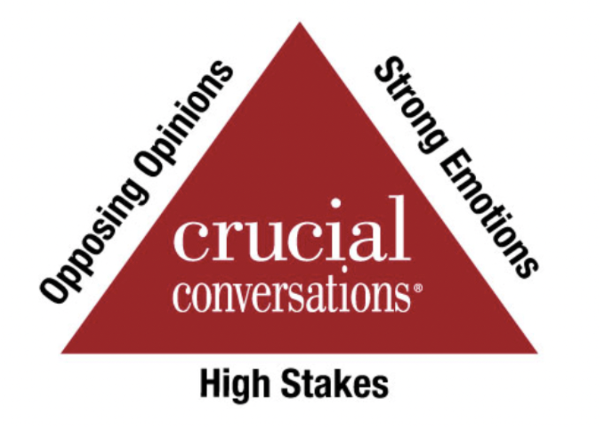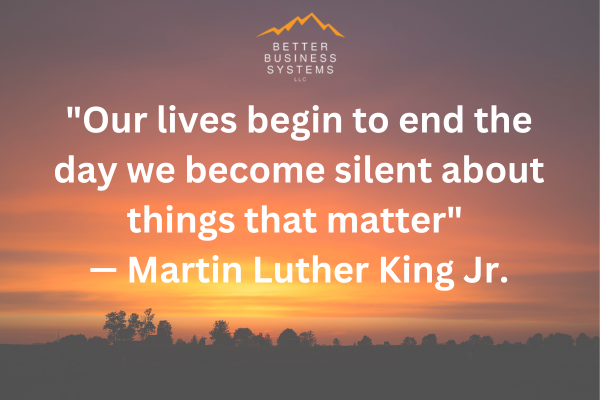Tools for Talking When the Stakes Are High
As business leaders, most of us can relate to being stressed about having to fire a well-liked employee who wasn’t performing. Likely the employee was put on a performance plan but wasn’t able to fulfill his or her commitments – yet scheduling the difficult conversation dragged on for months. Meanwhile, the employee’s team and others in the organization are frustrated and losing respect for our leadership.
Or perhaps you haven’t handled a family matter very well. A difficult conversation took a turn for the worse when you became escalated, lost control over emotions, and said things that later would be regretful. Now there’s a distance between you and the family member – with holidays being awkward for the entire family.
Difficult, or “crucial,” conversations are the cause of many of our most painful problems at work and at home. These stressful conversations can rapidly go downhill, with people behaving at their worst. Interestingly, research shows that the primary predictor of our success in a crucial conversation has less to do with how we use our mouth, and more to do with what we do before we open it!
Read on to learn how to better handle a heated conversation!
The book, Crucial Conversations, is considered life-changing for many people. It explains that how we deal with uncomfortable conversations can actually predict the magnitude of our influence, the health of our teams, the strength of customer relationships, the quality of our marriages and friendships, and even our own personal health. Different than your everyday, normal conversations, these difficult conversations become “crucial” when there are:
(1) differences of opinion
(2) high stakes with huge consequences
(3) emotions that run strong.
After thousands of hours observing these conversations, the authors explain that unfortunately when it matters most, we do our worst. Some examples of conversations that could become crucial are:
-
Asking a friend to repay a long overdue loan
-
Firing an employee
-
Asking a client to keep their commitments
-
Ending a relationship
-
Asking a family member to quit interfering
-
Talking to a coworker about a personal hygiene problem
If your heart beats faster just reading this list, that’s normal. But here’s the good news! There are several things we can do to prepare for a crucial conversation.
Slow Things Down
When a conversation becomes crucial, our stress hormones shift our thinking to short-term fright or flight mode. We worry if others will like us, if we look good, being right, winning or avoiding conflict. The trick is to reset our motives by asking a simple question: What do I really want?
Consider this question on four levels: What do I really want for me, for the other person, for the relationship, and for the other stakeholders? In the case of the conflict-avoidant leader above, a deeper motive might be to:
- Protect the company and its customers
- Support an employee’s team
- Ensure that the individual knows he or she is cared for
- Provide support during a job search
By slowing down and considering our motivations, we can elevate our thinking to a higher-level goal of wanting to find a mutually beneficial solution that strengthens the relationship. Best, we feel a sense of calm and confidence that improves the quality of the conversation.
Monitor Your Emotional State
If we escalate emotionally, becoming angry or defensive, for example, our stress hormones will put us right back into the short-term thinking trap of needing to win or be right.
According to the authors, our natural tendency is to either clam up because we’re scared to speak up or to lash out angrily. We choose silence or violence.
Silence – because our experience taught us that bad things happen when we’re emotional or honest.
Violence – because we’re unskilled at holding crucial conversations effectively. We likely developed our existing style by watching parents, friends, a coach, or a former boss using sarcasm, caustic humor, guilt trips, debate tactics, stream rolling, interrupting, controlling, name-calling, generalizing, and other forms of verbal violence like intimidating and ridiculing others.
We need to detach from our ego, take on a posture of humility, and think about how we can help the other person get what they want AND work toward getting what we want for ourselves.
Seek Broader Perspectives
Often crucial conversations degenerate into opposing opinions, rather than building a shared pool of information. Rather than just saying what we think and triggering fright or flight behavior, again…slow it down. Ask questions about the other perspective. Gather all the facts. Listen. Paraphrase so the other person knows you’re listening. Show a willingness to be challenged. The more information and understanding we can share, the higher our chances of making the right decisions, and the right compromises. Ask: How can I be 100% honest AND at the same time be 100% respectful?
Define the Next Steps
Without action, all the healthy talk in the world will eventually lead to disappointment. To take action, always mutually agree on when and how follow-ups will take place. This could look like:
- An email confirming action by a certain date
- Full report in a team meeting
- Follow-up coaching conversation
- Setting a dinner date to follow up
Skillfully navigating difficult conversations will take your personal and professional relationships to the next level. Instead of avoiding issues or bringing them up in a way that creates defensiveness, you’ll be able to navigate situations effectively. The alternative takes much longer because it simply doesn’t work.




